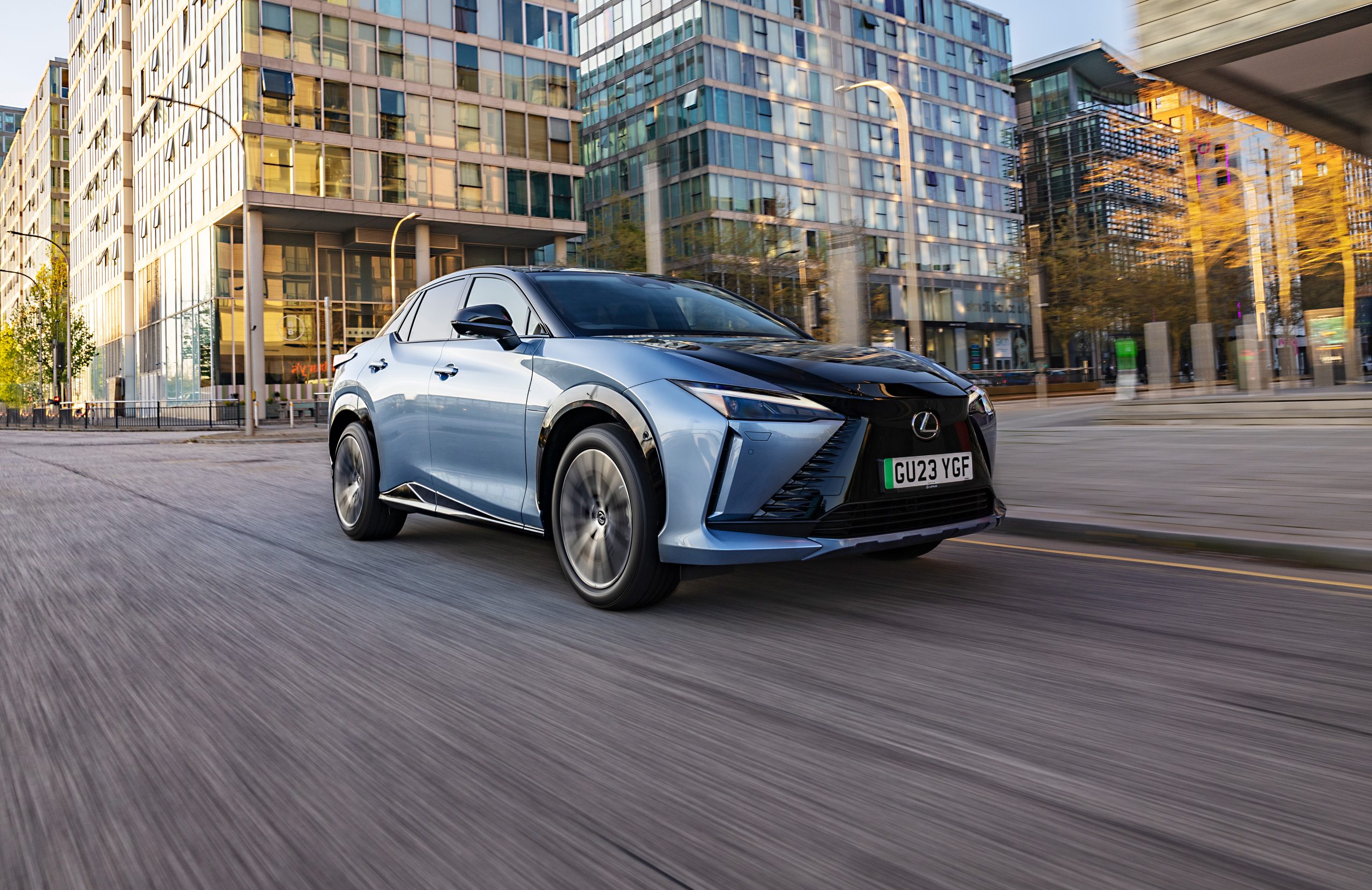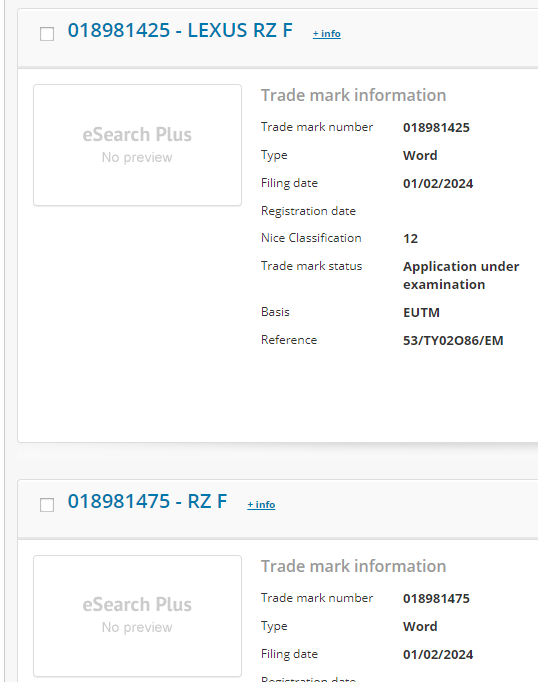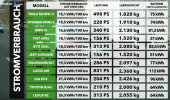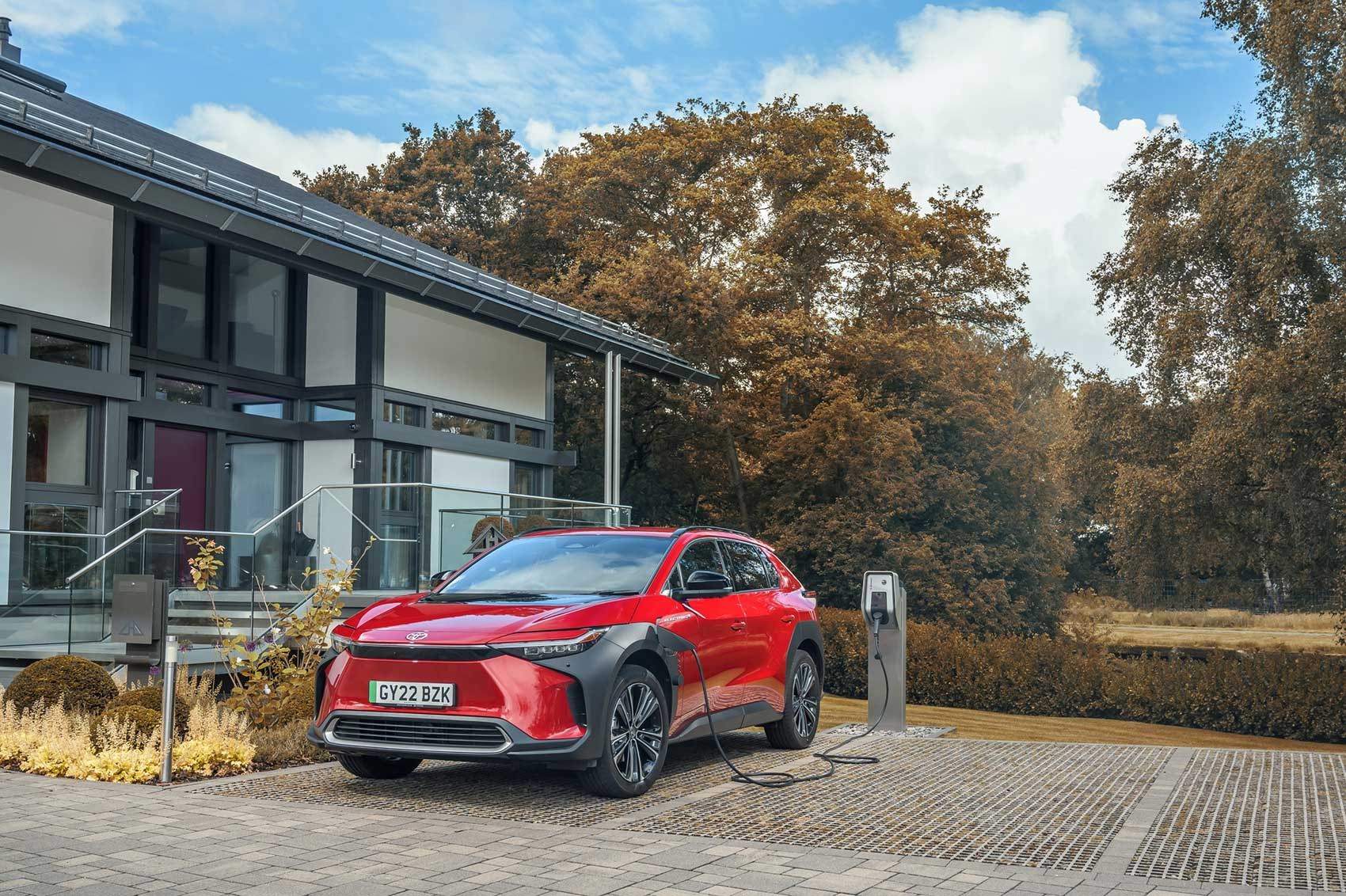You are using an out of date browser. It may not display this or other websites correctly.
You should upgrade or use an alternative browser.
You should upgrade or use an alternative browser.
The Lexus RZ Megathread (450e, 300e)
- Thread starter krew
- Start date
qtb007
Admirer
- Messages
- 500
- Reactions
- 754
JMO, but it isn’t shocking at all that this was made for Japan market. They love that over the top visual trims/packages there. Check out all the wild modellista packages available for everything there.It's 100 more than they needed to do IMO... Struggling to understand how Lexus get that thing approved... After years of tasteful F-Sport and now FSP models doing 100 of this thing...
Gecko
Administrator
- Messages
- 4,943
- Reactions
- 11,918
Kind of lame the RZ "F-Sport Performance" is just a body kit. There's not even upgrades on the handling side besides wider tires. There is no consistency in their execution of the four-tier F brand strategy. By their own definition it should be "F-Sport Design".
Very this. No idea what Lexus is doing with this, and it goes against their alleged F SPORT/FSP/F strategy.
mikeavelli
Moderator
- Messages
- 7,083
- Reactions
- 15,725
I think the website had over a million yen?Has it been confirmed for production? Found my answer. Since it's just a special edition I think the real full production model RZ FSP should be RZ500 just like every other FSP before it or even better the 550. The RZ450e FSP looks like a regular 3sereies with an m package.
But I really hope they get rid of the double spoiler thing it don't look right.
Also lexus needs to get their S**t together. First it was the regular looking TX500 FSP with a better 550h above it. Now we have a RZ450e fsp when we have seen trademarks of 500 and 550. Too disorganized almost as if they are trying to make their dealers and customer play a guessing game.
The regular RZ450e is ¥8,800,000. The "FSP" is ¥11,800,000. So customers are paying 34% more just for a body kit.I think the website had over a million yen?

Lexus RZ 450e named SUV Electric Car of the Year - Lexus Media Site
Lexus RZ 450e named SUV Electric Car of the Year
F is not going away!!!

This is nice and cool but isn't it better for the F to be used on next gen BEV instead?
I just feel like it's not worth the energy investing in this first-gen product.
F1 Silver Arrows
Expert
- Messages
- 2,395
- Reactions
- 3,869
This is nice and cool but isn't it better for the F to be used on next gen BEV instead?
I just feel like it's not worth the energy investing in this first-gen product.
I am not questioning it. Just bring a damn F product already. 😫😭
The is nothing much wrong with the RZ. Better range faster charging more power are all possible upgrades that could make the car the best BEV. It is so simple with BEVs. Handling, comfort and all that, the RZ already has. And it looks quite ok too, at least better than what Kia/Hyundai/Genesis have, better than BMW iX, and than Mercedes EQ series, and of course Tesla.
Kelvin2020
Admirer
- Messages
- 547
- Reactions
- 1,221
I think the RZ looks pretty cool, especially from the sideThe is nothing much wrong with the RZ. Better range faster charging more power are all possible upgrades that could make the car the best BEV. It is so simple with BEVs. Handling, comfort and all that, the RZ already has. And it looks quite ok too, at least better than what Kia/Hyundai/Genesis have, better than BMW iX, and than Mercedes EQ series, and of course Tesla.
Tragic Bronson
Expert
- Messages
- 2,985
- Reactions
- 3,603
If you're in Colorado
The Lexus RZ has the craziest deal we've seen to date, and it's only for Coloradoans. According to bulletins sent to dealers, the all-electric luxury SUV has a discount worth over $20,000 off MSRP. Lexus says that this could result in 2023 Lexus RZ EV lease prices in Colorado starting at just $299 per month.
Through March 4th, the 2023 Lexus RZ features $20,350 in lease cash. This is essentially a rebate that you can only get when leasing. In other parts of the country, the EV has a $15,000 incentive. The difference is that Lexus is now including the Colorado Innovative Motor Vehicle Tax Credit as an upfront discount.
Coloradoans eligible for the tax credit can now assign the incentive to their lender. So why the oddly specific amount of $20,350? While the Colorado EV tax credit is worth $5,000, a provision allows a $5,600 combined amount when the credit is assigned, presumably to factor in applicable administrative costs.
We think it's likely that Lexus is assessing a $250 processing fee, bringing the potential savings from $25,600 down to $20,350. If our guess is accurate, this wouldn't be all that surprising. After all, a bulletin from BMW last month announced that the brand would assess a $250 processing fee in the same scenario.
With the discount, the 2023 Lexus RZ 450e Premium can be leased from $299 for 24 months with $4,999 due at signing. That's based on an MSRP of $62,350 with destination and 7,500 miles per year. We think Lexus is using the higher residual value of a shorter lease and mileage allowance to offer the best price possible.
Thinking of leasing the 2024 Lexus RZ instead? The new RZ 300e has a $16,350 discount for Colorado lessees. The more powerful RZ 450e has a $17,850 incentive. These represent the best deals we've ever seen on the Lexus RZ, potentially making it a hidden deal when compared to other Lexus models.
With an effective cost of $507 per month, the Lexus RZ is now cheaper to lease than the $40,000 UX Hybrid. The UX 250h is the brand's most affordable model and leases for $469 for 36 months with $4,999 at signing at an effective cost of $608. That's $101 per month more than the RZ despite a $23,000 difference in MSRP.
CRSKTN
Expert
- Messages
- 2,112
- Reactions
- 3,476
Weird its almost like toyota knows something about long term life of its systems and skews conservative.
A Lucid, Tesla, Hyundai and BYD lead should warn you about those vehicles long term.
Besides what do these companies care? Stupid people will remember the first shouted lie and ignore the whispered truth down the line.
A Lucid, Tesla, Hyundai and BYD lead should warn you about those vehicles long term.
Besides what do these companies care? Stupid people will remember the first shouted lie and ignore the whispered truth down the line.
internalaudit
Expert
- Messages
- 1,169
- Reactions
- 1,150
The 90% capacity retention after 10 years? Maybe 70% in 20 years?
I am all for that.
I am all for that.
You should watch to the end. The BZ/RZ's problem is terrible efficiency. The BZ4X's electric consumption is 20% higher than the Kia EV9, a 3-row full-size SUV that is 20% heavier. The tested ranges are also 40% less than advertised while most other cars tested here are ~20% below advertised range. Being inefficient and lying to customers the most has nothing to do with reliability. Most EVs on the market today have very similar technology level and most differences come from design optimization.Weird its almost like toyota knows something about long term life of its systems and skews conservative.
A Lucid, Tesla, Hyundai and BYD lead should warn you about those vehicles long term.
Besides what do these companies care? Stupid people will remember the first shouted lie and ignore the whispered truth down the line.

Basic math: 90% of 243km is 219km, 80% of 448km is 358km. 358 > 219. A competitor model needs to suffer 50% battery degradation to match a brand new BZ/RZ.The 90% capacity retention after 10 years? Maybe 70% in 20 years?
I am all for that.
Advanced math: a Kia EV9 goes through 222 full charging cycles over 100000km (100000*21.4kWh/100km/96kWh) while a BZ4X goes through 401 cycles over the same distance. So it's actually the BZ4X that suffers more degradation cycles for the same mileage. If we use the typical 500 cycle lifetime of li-ion batteries and Toyota can somehow get 50% more lifetime than competitors (which is highly unlikely given the suppliers are the same), the EV9 would use up 44% of its usable cycles while the BZ4X would use 53%.
E-TNGA products in their current forms are indefensibly bad. The reliability argument is pure coping. Otherwise Lexus wouldn't be offering guaranteed value buy back for used RZs in China. They know their customers will likely get rid of the car in 3 years.
internalaudit
Expert
- Messages
- 1,169
- Reactions
- 1,150
Thanks for sharing the numbers (including poor efficiency compared to the competition) but I'm still looking purely from a battery longevity perspective. Driving range could be an indicator of remaining battery capacity but with reserves/buffer, it doesn't tell the complete picture and nor does it speak to potential longevity.You should watch to the end. The BZ/RZ's problem is terrible efficiency. The BZ4X's electric consumption is 20% higher than the Kia EV9, a 3-row full-size SUV that is 20% heavier. The tested ranges are also 40% less than advertised while most other cars tested here are ~20% below advertised range. Being inefficient and lying to customers the most has nothing to do with reliability. Most EVs on the market today have very similar technology level and most differences come from design optimization.
View attachment 8674
Basic math: 90% of 243km is 219km, 80% of 448km is 358km. 358 > 219. A competitor model needs to suffer 50% battery degradation to match a brand new BZ/RZ.
Advanced math: a Kia EV9 goes through 222 full charging cycles over 100000km (100000*21.4kWh/100km/96kWh) while a BZ4X goes through 401 cycles over the same distance. So it's actually the BZ4X that suffers more degradation cycles for the same mileage. If we use the typical 500 cycle lifetime of li-ion batteries and Toyota can somehow get 50% more lifetime than competitors (which is highly unlikely given the suppliers are the same), the EV9 would use up 44% of its usable cycles while the BZ4X would use 53%.
E-TNGA products in their current forms are indefensibly bad. The reliability argument is pure coping. Otherwise Lexus wouldn't be offering guaranteed value buy back for used RZs in China. They know their customers will likely get rid of the car in 3 years.
I'm not sure about batteries being created all equal if Toyota's software tend to baby its batteries more than the competition, which leads to reduce driving range and slower charging speed, both frowned upon by the industry. Sure, battery on the UX300e is also air cooled but until there's enough data on Toyota/Lexus liquid cooled BEV batteries crapping out at an average rate, I would reserve judgement until the verdict is out.
Your numbers are purely based on driving range, drop in range owing to degradation but does not even consider buffer/reserve capacity that could remain more intact with Toyota's "conservative" battery management system.
Toyota does have a lot of experience with battery cell balancing and the CT200h I bought off a friend now has 262,000 km and still on the original battery though I do drive a lot of highway miles to and from work so little toll on those miles.
90% capacity retention (Toyota's statement) vs 70% retention (industry standard, including Toyota's) prior to the end of eight years. I don't know with you but I'm one of the outliers and would rather have a short range BEV that lasts 20+ years, including the battery, than have to get a new BEV every eight to ten years.
I still recall Toyota saying 70-80% capacity retention over the life of the vehicle, which I would conservatively put at 20 years of service. I doubt many 2012/2013 Model S will get to that service life on their original batteries. I guess Toyota/Lexus will have to up its battery warranty coverage to walk its talk haha or people will take your calculations at face value and think Toyota is BSing the public but I still really think your calculations are flawed because everything I've read says keeping a big buffer leads to longer overall battery life because the state of charge will not always be down close to 0 or 100% (or overcharged) in reality, which is the reason many at the cell level crap out.
Also probably why the Bz and the Rz don't sell in great numbers. They're really compliance and first or 1.5 (if we count the UX300e) gen BEVs coming from Toyota/Lexus. Owners are probably Guinea pigs on these vehicles.
Anyway, let's see what the 2nd and 3rd gen Toyota BEVs will be like, including stated improvements in battery chemistry / technology.
Since we are on the topic of EVs, it's looking like we are going to proceed with the Macan 4 because of higher starting price ($15,000 CAD more than we expected), lack of PTV Plus as an option, and also because VAG and many others haven't probably sorted out BMS software / technology. Definitely don't mind buying used and gambling on the battery (but will get it inspected) but my wife and I aren't ballers. Will see what Lexus BEVs will have to offer in the coming years.
Last edited:
Toyota doesn't do cell balancing at all on their hybrids. That's why many Prius owners "recondition" their batteries (balance the cells externally) to extend their life. The BMS on these batteries are super primitive.Toyota does have a lot of experience with battery cell balancing and the CT200h I bought off a friend now has 262,000 km and still on the original battery though I do drive a lot of highway miles to and from work so little toll on those miles.
You don't feel battery degradation on their hybrids because battery power is only 15-20% of total system output and technically the hybrid system can still operate as long as the battery has enough charge to start the ICE. Many unconditioned 200k+ km hybrids can't run in EV mode at all and lose fuel economy. It has been well documented that reconditioning improves fuel economy by 2-3 MPG on high mileage samples.
Tesla actually has a similar buffer size (7kWh on the 75kWh Model 3) and has charging speed limiters to preserve battery. Would you arrive at the conclusion that Tesla also has class-leading battery durability?Your numbers are purely based on driving range, drop in range owing to degradation but does not even consider buffer/reserve capacity that could remain more intact with Toyota's "conservative" battery management system.
Let's also not forget most EVs now have battery preconditioning so the batteries are charged at a safe temperature in winter. The BZ/RZ can't do that till this day and their solution is a very lazy "nope you can't charge below a certain temperature at all" so the car is essentially bricked for the entire season.
To me the real secret Toyota can keep the reliability of these cars high is making them so frustrating to use the user barely drive them at all.
internalaudit
Expert
- Messages
- 1,169
- Reactions
- 1,150
Interesting to know and thanks for confirming that. Most likely simpler cell balancing with fewer battery count but I doubt BMS doesn't exist or batteries will be shot so much sooner. People replacing dead cells on HEVs don't mean lack of cell balancing. BEV batteries also do get replacements at the cell level. Batteries wear out sooner if BMS isn't optimal.Toyota doesn't do cell balancing at all on their hybrids. That's why many Prius owners "recondition" their batteries (balance the cells externally) to extend their life. The BMS on these batteries are super primitive.
You don't feel battery degradation on their hybrids because battery power is only 15-20% of total system output and technically the hybrid system can still operate as long as the battery has enough charge to start the ICE. Many unconditioned 200k+ km hybrids can't run in EV mode at all and lose a lot of fuel economy.
Tesla actually has a similar buffer size (7kWh on the 75kWh Model 3) and has charging speed limiters to preserve battery. Would you arrive at the conclusion that Tesla also has class-leading battery durability?
Let's also not forget most EVs now have battery preconditioning so the batteries are charged at a safe temperature in winter. The BZ/RZ can't do that till this day and their solution is a very lazy "nope you can't charge below a certain temperature at all" so the car is essentially bricked for the entire season.
To me the real secret Toyota can keep the reliability of these cars high is making them so frustrating to use the user barely drive them at all.
Mine has 262,000 km and still runs on EV mode that I don't bother unless I'm parking in the garage. Also fuel efficiency is around 40-45 US MPG depending on outside temperature. The more I use pure EV mode on the road, the more wear likely on the battery pack anyway. Of course, many will have issues and mine will eventually too.
This same buffer size as Tesla, was it before or after this Bz4X fiasco lol? I don't follow these things but you are the resident battery expert a few years ago.

Toyota revises bZ4X following misleading range storm
bZ4X's revised electric range projection coming summer 23, and all the spec details of Toyota's first EV
www.carmagazine.co.uk
I think many owners have realized the limitations and I read even Toyota markets these as city BEVs because of the relative short driving distance.
We still don't know about reliability over the long term, and eight years isn't really long enough for many people. Only people concerned about reliability and lower cost of ownership beyond eight years would flock to a Toyota or Lexus BEV. Anyone selling their BEVs before year eight will probably not bother with a Toyota/Lexus seeing how BEV powertrains are more reliable than many ICE out there, especially with the longer powertrain warranty.
Like you said, it is subpar in terms of driving distance, charging speed and even efficiency, all looking to me to prolong and mitigate battery degradation in current Li-ion batteries.
Again, I'm not saying I would consider a current gen Toyota or Lexus BEV at MSRP (or close to) but at least they have a commercial product and loyalists will just have to wait for better BEVs down the road. If I wanted a used BEV past eight years old, Toyota/Lexus are probably the ones I would consider. Just because I know the BEVs are sub-standard in everything related to keeping the battery pack healthy.
Last edited:
-
This site uses cookies to help personalise content, tailor your experience and to keep you logged in if you register.
By continuing to use this site, you are consenting to our use of cookies.
